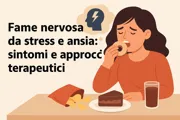

In this article, we explore what emotional hunger from stress is, how emotions like anxiety affect eating habits, and which therapeutic strategies are considered most effective. Some insights may surprise you.
Emotional hunger
When we talk about nutrition and emotional hunger from stress, we're effectively creating a connection between the way we eat, the way we consume food, and the moods that can strongly influence how we tend to eat.
Many of us, perhaps without realizing it, have experienced this: when we're under stress, when anxiety levels are very high—whether due to excessive workloads, worries about the future, or certain problems we'll face, whether we like it or not—the way we eat, the way we typically take food into our bodies, can also change.
We can therefore effectively speak of a sort of eating behavior based on which we regulate our eating habits and even the time we devote to food.
Let's think for a moment about the moods we can experience at certain times. They can be characterized by various emotional nuances, and these can directly influence our eating habits and even the foods we tend to eat. Let's see what these emotional states are:
If we experience fear related to anxiety, our eating habits may change;
If we're experiencing a period of intense stress, we'll likely tend to change our eating habits without even realizing it;
If we're sad, or experiencing a period of sadness mixed with melancholy, we may experience changes in our eating habits.
What happens inside a person is that the urge to eat, our appetite, can significantly increase. Consequently, with a stronger appetite, we might decide to change our usual daily eating habits and perhaps introduce foods higher in fat or sugar into our diet.
However, using a term that identifies a higher level of nervousness, and therefore focuses on nutrition and how we eat, isn't entirely correct. We can instead say that a person who presents this specific problem tends to use food as a sort of means to more quickly deal with a situation, an event, an event that turns out to be particularly stressful.
What actually happens is that a person accustomed to eating a certain way varies their diet, eating a greater amount of food or perhaps including foods they don't usually consume. These include foods such as sweets, foods high in fat and sugar.
This change in eating habits is a response to negative events, situations, or experiences that can significantly alter the way a person eats and eats. This change in behavior can lead a person to eat more than usual, or, conversely, to view food not as an ally but as something negative, and thus to implement behaviors based on avoiding food in general, reducing its quantity over time.
Behaviors that involve avoiding food in general and reducing the amount of food consumed over time.
The individual may therefore adopt two specific behaviors:
The stressful event triggers a greater need to eat, including a variety of foods consumed;
The stressful event may, conversely, lead to food avoidance; in practice, the individual has a reduced appetite and less urge to eat.
The person may therefore adopt two specific behaviors:
The stressful event triggers a greater need to eat in the person, which also varies the foods they consume;
The stressful event may, conversely, lead to avoidance of food; in practice, the person has a reduced appetite and less urge to eat.
So, someone experiencing intense stress, particularly anxiety, sees food as a panacea. For this reason, perhaps overcome by a general sense of sadness, or by a strong state of anxiety brought on by significant work-related stress, they see food as a more than valid reason to take a break from stressful and worry-filled activities, such as:
Food becomes a pleasant escape from a stressful work situation;
For example, a university student taking tough exams might want a break by treating themselves to a moment of relaxation with food.
However, we don't necessarily have to identify food as a positive emotion. They could also be gripped by a negative emotion, such as anger. In these specific cases, food isn't seen as something healthy, but simply a stimulus triggered by an emotional turmoil within the individual.
Recent studies have shown that a person's eating habits are strongly influenced by stress related to certain biological dynamics. In practice, a prolonged stressful condition, which can even become chronic, creates a change in the way the hypothalamic-pituitary gland and adrenal glands regulate themselves.
In men, the release of a substance like cortisol tends to increase a person's eating behavior because it stimulates the appetite. Eating habits also change; people are more likely to choose fatty or sweet foods, which, precisely because of their composition, can reduce the stress load in the short-term that the person is experiencing.
Therefore, prolonged stress, or work conditions overly burdened by stressful problems, could induce a nervous hunger response that is not related to stimuli related to the sense of hunger or the need to satiate oneself, but is triggered by purely emotional signals.
Recent studies have sought to fully understand whether a person experiencing an increased appetite for nervous reasons can help produce a state of temporary well-being. Essentially, when they eat, they experience positive emotions and sensations that reduce and diminish the negative emotional states they were experiencing.
However, it remains to be seen whether this individual approach to stressful stimuli, which we might also define as "compensatory," is truly useful and produces a state of well-being that counteracts the discomfort caused by the negative stressful event, or whether, conversely, it leads to a deterioration in the subject's emotional state over time.

For further reading, check the Wikipedia page on emotional eating.
To better understand how memory and emotional distortion are linked, refer to the FAQ section of our article on confabulation.
It's an urge to eat triggered by emotional tension or anxiety rather than by physical hunger or nutritional need.
Stress, anxiety, sadness, and frustration can significantly alter eating patterns and appetite.
Cortisol, a hormone released during stress, increases appetite and promotes cravings for fatty and sugary foods.
Yes. If persistent, it may contribute to eating disorders like binge eating or bulimia.
Mindfulness, cognitive-behavioral therapy, and emotional awareness techniques can help reduce stress-related overeating.
Physical hunger is gradual and tied to biological need. Emotional hunger appears suddenly, driven by feelings, and is not resolved with fullness.
← Read also: Confabulation – memory distortion and psychological mechanisms